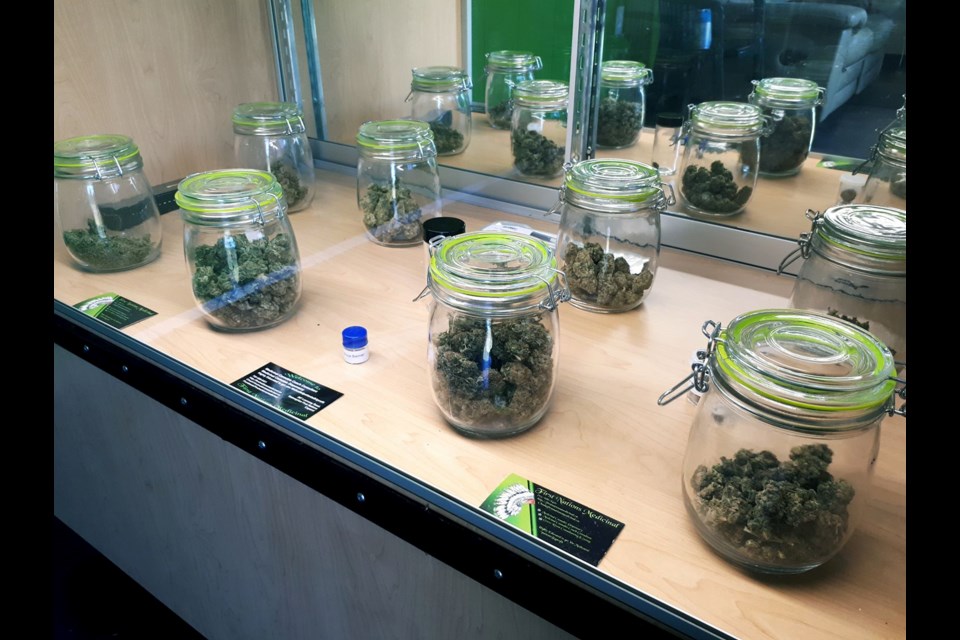With formal legalization still several months away, a Sudbury area man has gotten a head start, operating a marijuana dispensary on Wahnapitae First Nation near Capreol.
Chadwick Mcgregor says he and his girlfriend bought an office trailer and opened First Nations Medicinal in September.
Business has been brisk, he said. They sell to both recreational and medicinal pot users, but most who visit the business are recreational users. The couple get their supply from licensed growers, he added.
"We have a wide range (of customers) right now,” Mcgregor said. “We are doing a lot of recreational (sales) ... but we have a wide range — people from 19 all the way to 70 years old."
They offer 20 different strains of cannabis, as well as a range of candy edibles. Mcgregor said he had been a “prohibition grower” of pot for about 17 years. But he had personal addiction issues and became a victim of the opioid crisis that is sweeping North America.
"I went on methadone for opiate addiction when I was addicted to pills,” he said. “I got back into growing when I was going through the methadone program.
"Cannabis helped me get through the withdrawal symptoms. It helped me get through the whole program and complete it and get off of it completely. Since that time, I've gotten off all other prescriptions, as well — anti-depressants, anti-anxiety pills, stuff like that."
With no local dispensaries, Mcgregor visited ones down south. That got him thinking that medicinal users in the North should have a way to get their medicine without having to wait for it through the mail.
"I saw a need for it up here,” he said. “There was no place where someone could get it that day. There were people out there in need who could not get their medicine that day when they required it. There was a need for it here in the Sudbury area."
When pot becomes legal across the country next year, he said they want to start charging recreational users a bit more to lower the prices for medicinal users. But all the prices are the same right now.
"There's not any way for them to pay for the medicine — there's no (drug plan) coverage or anything like that," Mcgregor said. "The government is planning to do recreational, so that's what we're going to do to help out (medicinal users.)"
While still illegal under Canadian law, Mcgregor said it's legal for First Nations to operate dispensaries.
"I believe I'm operating legally," he said. "I believe I'm operating under United Nations treaty rights that gives me the protection to do what I'm doing."
He has been open with the local Anishinabek Police Service, he said, who have visited his shop.
"I've reached out to them to let them know what I have been doing,” Mcgregor said. “My intention from the beginning was to let police know, to be transparent with them and let them know exactly what we're doing.
This isn't illicit drugs or substances they have been trained to act against, Mcgregor argues. It's actually healing medicine.
He's doing a presentation for band chief and council on Nov. 18, Mcgregor said, and has invited police to come and listen.
"I have tried to open that communication door with them,” he said. “We'll see from here what their communication is going to be."
Maryse Durette, senior media relations adviser with Health Canada, confirmed in an email that selling marijuana to recreational users is still illegal in Canada.
“It is a federal criminal law of general application that applies to all of Canada, and to all people in Canada, and it prohibits the production, sale and possession of cannabis,” Durette wrote.
“Thus, storefront operations selling cannabis, commonly known as 'dispensaries' and 'compassion clubs' are not licensed by Health Canada under the current law and are illegal.”
However, she said First Nations, under Canada's constitution, treaties and self-government agreements, have the authority to control how certain issues are dealt with and regulated. The federal government is committed to working with First Nations communities to deal with such issues, she said.
“The Government of Canada is continuing to engage in discussions with Indigenous peoples as part of its efforts to facilitate the implementation of the proposed Cannabis Act, and to better understand the unique interests of Indigenous communities.”
Mcgregor said he's working with about 20 other First Nations dispensaries in southern Ontario on coming up with regulations for the industry, as well as education programs.
"We're working on a system ... to regulate it ourselves," he said. "We want to create our own system, instead of Health Canada doing it for us. We want to create a better education system for the dispensaries.
"And we try to educate everyone who comes in about the products and how to use them and make sure no one is leaving the shop not knowing what they're taking ... It's not like drug dealing where you walk up to the counter, grab your stuff and walk out. We don't believe in doing it like that. The education should be there. (And) there are rules to abide by when you come in."
They have membership forms, patients have to sign in, prove they are 19, and answer a series of questions about how they use cannabis and how it helps them.
"Some strains are better for different ailments," he said.
They currently have five employees and the business is growing every week, Mcgregor said. They're open seven days a week now, but will cut that to six days for the winter.
